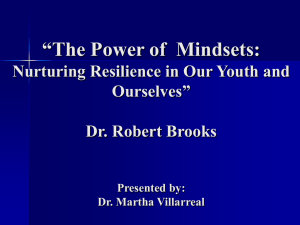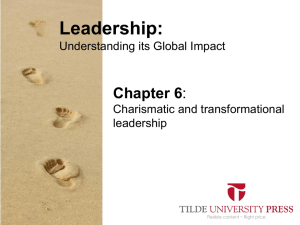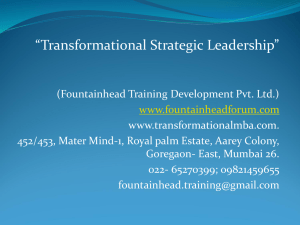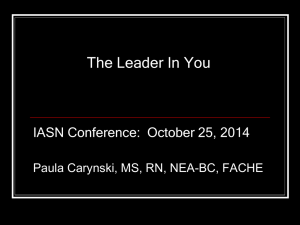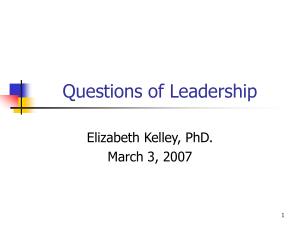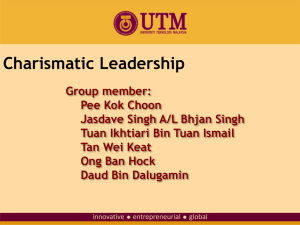The Utility of Experimental Research in the Study of
advertisement
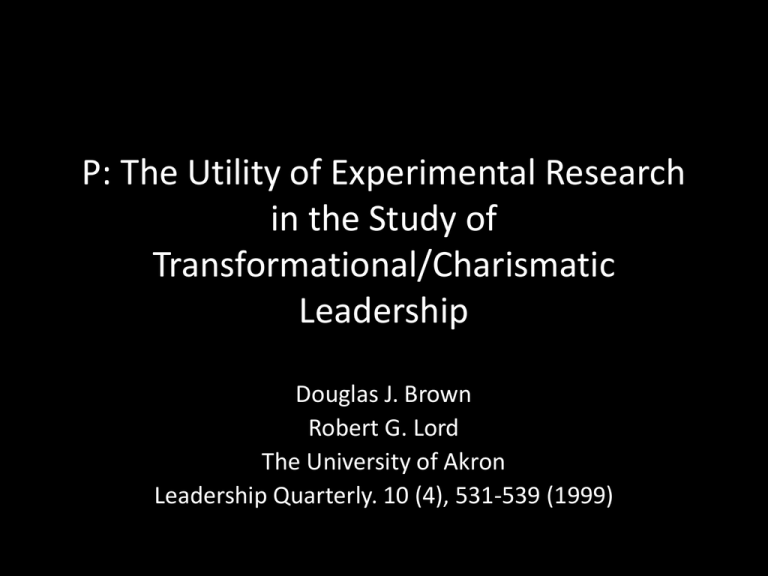
P: The Utility of Experimental Research in the Study of Transformational/Charismatic Leadership Douglas J. Brown Robert G. Lord The University of Akron Leadership Quarterly. 10 (4), 531-539 (1999) Journal Article Purpose Authors argue the case that experimental approaches would complement the existing Transformational/ Charismatic leadership body of research Pg 531 The Utility of Experimental Research in the Study of Transformational/Charismatic LeadershipDouglas J. Brown Robert G. Lord The University of Akron Leadership Quarterly. 10 (4), 531-539 (1999) Laboratory Experiment v Fieldwork • Griffin & Kavmar (1991) review of the organizational literature in Journal of Organizational Behavior: - 7.5% Laboratory - 55% Fieldwork Pg 531 The Utility of Experimental Research in the Study of Transformational/Charismatic LeadershipDouglas J. Brown Robert G. Lord The University of Akron Leadership Quarterly. 10 (4), 531-539 (1999) Laboratory Experiment v Fieldwork (2010) • Gardner et al (2010) in the Leadership Quarterly of the last decade – Laboratory 5% – Field study 16% Laboratory Experiment v Fieldwork (2010) In Gardner et al (2010) article further encouragement is given to: “give greater consideration for the potential for laboratory research to not only permit strong inferences regarding causal relations among leadership constructs, but to illustrate the types of potentially productive forms of leadership that could occur under the right circumstances (Mook, 1983)” Multifactor Leadership Questionnaire (MLQ) Survey Instrument • Multifactor Leadership Questionnaire (MLQ) asks respondents to identify observed behaviors of leaders: Five dimensions: – Idealized influence attributed – Idealized influence behavior – Inspirational motivation – Intellectual simulation – Individualized consideration • Empirical and theoretical research points to leadership behaviors, perceptions and subsequent actions are made in a non-conscious way so subordinates would find difficult to assess by survey Pg 532 The Utility of Experimental Research in the Study of Transformational/Charismatic LeadershipDouglas J. Brown Robert G. Lord The University of Akron Leadership Quarterly. 10 (4), 531-539 (1999) Multifactor Leadership Questionnaire (MLQ) Survey Instrument ORDINAL LIKERT SCALE Forty-five descriptive statements. Judge how frequently each statement fits the person you are describing. Use the following rating scale: 0 Not At All 1 Once in a While 2 Sometimes 3 Fairly Often 4 Frequently, if not always 1. Talks optimistically about the future 0 1 2 3 4 2. Spends time teaching and coaching 0 1 2 3 4 3. Avoids making decisions 0 1 2 3 4 The Utility of Experimental Research in the Study of Transformational/Charismatic LeadershipDouglas J. Brown Robert G. Lord The University of Akron Leadership Quarterly. 10 (4), 531-539 (1999) Multifactor Leadership Questionnaire (MLQ) Survey Instrument Construct Validity Issue • Authors question the usefulness of measuring transformational leadership using a multi dimensional construct • Each dimension hard to differentiate Pg 535 The Utility of Experimental Research in the Study of Transformational/Charismatic LeadershipDouglas J. Brown Robert G. Lord The University of Akron Leadership Quarterly. 10 (4), 531-539 (1999) Importance of Non Conscious Influence • Awamleh and Gardner (1999) – Manipulation of the delivery style of a visionary video presentation (fake CEO) with student audience • Independent Variable – Delivery style • Impact on Dependent Variable – Charisma - Causal relationship 58% variance – Effectiveness – Causal relationship 30% variance • Chartrand and Bargh (1999) – Chameleon Effect: Reported greater liking for the confederate who mirrored the movements of individuals Pg 533 The Utility of Experimental Research in the Study of Transformational/Charismatic LeadershipDouglas J. Brown Robert G. Lord The University of Akron Leadership Quarterly. 10 (4), 531-539 (1999) Benefits of Complementing Research with Laboratory Experiment • Supports the study of non-conscious aspects of Transformational/Charismatic Leadership Pg 532 • Field data and survey techniques do not adequately measure non-conscious aspects Pg 533 • More balanced and effective training interventions as both conscious and non conscious factors included Pg 534 The Utility of Experimental Research in the Study of Transformational/Charismatic LeadershipDouglas J. Brown Robert G. Lord The University of Akron Leadership Quarterly. 10 (4), 531-539 (1999) Lab Experiments Three-Horned Effect • It brings participants into an artificial setting for research purposes (Meltzoff, 1998). • Strength: maximizes precision in measurement • Weakness: low population generalizability and realism of context The Utility of Experimental Research in the Study of Transformational/Charismatic LeadershipDouglas J. Brown Robert G. Lord The University of Akron Leadership Quarterly. 10 (4), 531-539 (1999) Benefits of Lab Experiment Laboratory Research is Useful for Innovation and Discovery • Important objective of research is innovation and discovery of new relationships that don’t happen naturally in existing relationships (measured by field/surveys – what is) • Lab experiments allow for manipulation of variables in constructs • Deconstruct unique attributes in constructs that may be too closely interralated in natural settings pg534 The Utility of Experimental Research in the Study of Transformational/Charismatic LeadershipDouglas J. Brown Robert G. Lord The University of Akron Leadership Quarterly. 10 (4), 531-539 (1999) Benefits of Survey Benefits of Experimental • Study the conscious • What is the state of world (natural co-variation) • Make estimates of the size of the effect in the real world • Investigate developmental phenomena • Investigate the phenomenon of interest within the full complexity of its natural setting • Study the non-conscious • What the could be (artificial co-variation) • Make causal statements regarding the relationship between two constructs (internal validation high) • Study effects within compressed timeline • Study basic cognitive and affective processes that may underlie the effects • Investigate rare issues or ethically prohibitive pg536 The Utility of Experimental Research in the Study of Transformational/Charismatic LeadershipDouglas J. Brown Robert G. Lord The University of Akron Leadership Quarterly. 10 (4), 531-539 (1999) Challenging Conventional Wisdom • External validity issue – Argument that results may not be generalized to the real world population – Above assumes that the role of research is to describe what is • Lab research supports discovery and innovation – Generalizations or principles that can be applied to scientifically-based interventions pg535 The Utility of Experimental Research in the Study of Transformational/Charismatic LeadershipDouglas J. Brown Robert G. Lord The University of Akron Leadership Quarterly. 10 (4), 531-539 (1999) Conclusion • Experimental methods are encouraged but not at the expense of other methods – Balanced methodological approach Triangulation • Any single research technique has its limitations • Enthusiastic about the four experimental studies presented in previous issue of LQ pg538 The Utility of Experimental Research in the Study of Transformational/Charismatic LeadershipDouglas J. Brown Robert G. Lord The University of Akron Leadership Quarterly. 10 (4), 531-539 (1999) FOUR EXPERIMENTAL STUDIES Perceptions of leader charisma and effectiveness: The effects of vision content, delivery, and organizational performance Raed Awamleha, William L. Gardnerb, , a University of Jordan, Amman, Jordan b University of Mississippi, University, MS USA Available online 18 November 1999. Abstract This study examined the effects of vision content, delivery and organizational performance on perceptions of leader charisma and effectiveness. Subjects included 304 undergraduates who were presented videotaped speeches by a bogus CEO of a software company. A 2 × 2 × 2 design was employed in which message content (visionary/non-visionary), delivery (strong/weak), and organizational performance (high/low) were manipulated. A modified, 7-item version of Meindl and Ehrlich's (1988) Romance of Leadership Scale (RLS-D) served as a covariate. A MANCOVA analysis indicated significant effects of delivery, content, and organizational performance on both perceived leader charisma and effectiveness. The RLS-D was unrelated to either dependent variable as a covariate. The results suggest that strength of delivery is an especially important determinant of perceptions' of leader charisma and effectiveness. Although speech content and organizational performance cues likewise accounted for variance in these perceptions, their effects were at times offset by those of delivery. THE MODEL OF FOLLOWERS’ RESPONSES TO SELF-SACRIFICIAL LEADERSHIP: AN EMPIRICAL TEST Yeon Choi Hong Ik University Renate R. Mai-Dalton* The University of Kansas This article reports the results of two studies that tested the Model of Self-Sacrificial Leadership. The Model explores why self-sacrificial behaviors would arise in organizational settings and the effects this would have on followers when a leader exhibits self-sacrificial behaviors. Two experimental studies were conducted with 357 student and 157 industry subjects to investigate the effects of self-sacrificial leader behaviors on the followers’ perceptions and attitudes. The main hypotheses of the Model were confirmed: (1) Followers attributed charisma and legitimacy to a self-sacrificial leader and (2) intended to reciprocate such a leader’s behaviors. These effects were moderated by the followers’ perceptions of the leader’s competence. Implications of the results are discussed and future research directions are proposed. CHARISMATIC LEADERSHIP AND TASK FEEDBACK: A LABORATORY STUDY OF THEIR EFFECTS ON SELF-EFFICACY AND TASK PERFORMANCE Christine M. Shea* The University of New Hampshire Jane M. Howell The University of Western Ontario This article examines the interactive effects of two different leadership styles (charismatic and noncharismatic) and three types of task feedback (internal, external, and no feedback) on individuals’ self-efficacy and performance quality over four trials of a manufacturing task. Ninety-nine graduate students manufactured electrical wiring harnesses under the direction of either a charismatic or noncharismatic leader (an experimental confederate). Participants exposed to the charismatic leader had similar task performance regardless of task feedback condition, while participants exposed to the noncharismatic leader differed in their task performance depending on whether or not they received task feedback. Self-efficacy mediated the effect of task feedback and its interaction with charismatic leadership on performance. Explanations and implications of the results are discussed. THE EFFECTS OF VISIONARY AND CRISIS-RESPONSIVE CHARISMA ON FOLLOWERS: AN EXPERIMENTALEXAMINATION OF TWO KINDS OF CHARISMATIC LEADERSHIP James G. (Jerry) Hunt* Kimberly B. Boal George E. Dodge Institute for Leadership Research @ Texas Tech A single factor, seven-level, repeated measures, unbalanced experiment was conducted with 191 college undergraduates to test Boal and Bryson’s (1988) assertions that: (1) there are at least two forms of charismatic leadership under crisis conditions—visionary and crisis-responsive; and (2) once the crisis condition has abated, the effects of crisis-responsive leadership deteriorate comparatively faster than other forms of charismatic leadership. The experiment consisted of four crisis condition leadership treatments (crisis-responsive, visionary under crisis, exchange under crisis, and low expressiveness under crisis) and three no-crisis condition leadership treatments (visionary no crisis, exchange no crisis, and low expressiveness no crisis) at time one followed by low expressiveness no crisis at time two. Two graduate student “leaders” who memorized carefully prepared scripts delivered the leadership treatments. Analysis consisted of 28 a priori comparisons of cell means and repeated measures ANOVA to determine significant main effects as well as interactions. We found support for our hypothesis that there are two forms of charisma (visionary and crisis-responsive) and that, in the absence of crisis, the effects of crisis responsive charisma decay faster than do the effects of visionary charisma. • Question type of Experiment Context • Design • Use explain causal relatonships The Utility of Experimental Research in the Study of Transformational/Charismatic LeadershipDouglas J. Brown Robert G. Lord The University of Akron
